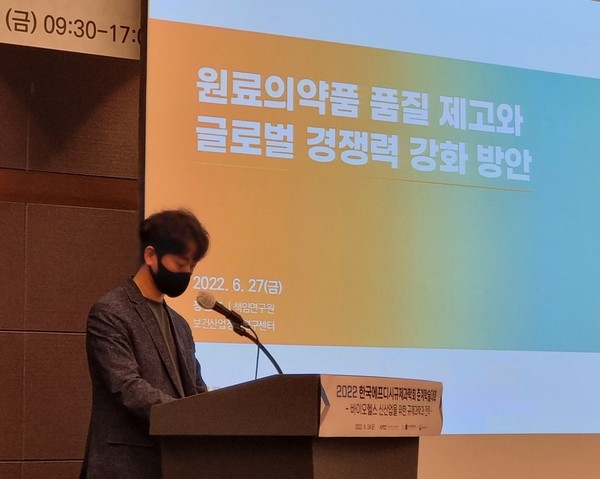“In conducting this study, I met many insiders of the active pharmaceutical ingredient (API) industry, and most of them said, ‘We are like abandoned children,’ or ‘Everyone knows that the pharmaceutical industry can hardly move forward without a competitive API sector. Unfortunately, however, the government has provided little support for it.”
So said Cheong Sun-kyu, a senior researcher of the Korea Healthcare Industry Policy Research Center, at a workshop organized by the Korea Society of Food, Drug and Cosmetics Regulatory Sciences last Friday.

Cheong made this and other points while presenting his study on the current status of the domestic API sector.
According to his study, the global API market accounts for 13-15 percent of the total pharmaceutical market. Its market size stood at about 230 trillion won ($177.5 billion) in 2020 and is estimated to grow 7.2 percent annually to 326 trillion won in 2025.
Cheong attributed the rapid market growth to the global encouragement of generic drugs, the surge of biopharmaceutical products, and the reinvigoration of global CMO (contract manufacturing organization) and CDMO (contract development and manufacturing organization) markets.
Reflecting such a trend, the domestic API market in 2020 also grew 43.4 percent from 2019 to about 5 trillion won, which Cheong ascribed to the sharp increase of ingredients for Celltrion’s biosimilars.
However, domestic API makers’ revenues are small compared to the market size. In 2020, the combined sales of 12 major API firms, including Daewoong, Yuhan, Dongkuk, Chong Kun Dang, and Kolon -- stood at about 100 billion won ($77.8 million).
“Korea’s foreign trade of API had been imported-oriented for 10 years since 2010 but began to show improvement recently,” Cheong said.
He cited the lack of diverse supply sources of API as the problem facing the domestic pharmaceutical industry, noting that the supply of ingredients is concentrated in a few countries.
According to the research center’s analysis of the Drug Master File from January 201l to December 2020, India-made ingredients accounted for the largest share with 34.2 percent, followed by Chinese-made products with 23.2 percent, and the Korean products with 21.6 percent.
That contrasts sharply with the U.S., EU, and Japan cases, in which homemade ingredients took the lion’s share of DMF, according to the analysis.
In the case of Chinese API, aside from supply stoppage due to the detection of Valsartan Nitrosodimethylamine (NDMA), a carcinogen, and the Covid-19 pandemic, there always is the possibility of China’s weaponizing of medical products amid the escalating trade conflicts with the U.S., Cheong pointed out.
Also, according to the Korea Health Industry Development Institute (KHIDI)’s survey of 49 Korean API manufacturers in 2021, the company experienced difficulties making and marketing their products because of the global trend toward environment regulation and consequent cost-push, uncompetitive pricing compared to China, India and other emerging economies, development of new foreign markets, and the narrow domestic market.
“To solve these problems, the government needs to grasp concrete API demand and supply situation,” Cheong said. “A governance structure is needed in this regard with the Ministry of Food and Drug Safety playing a central role.”
Pointing out that the U.S. and Europe have conducted extensive surveys of the pharmaceutical supply network and discussions about possible problems, Cheong noted that Korea has been passive in this regard.
To improve the quality of API products and advance their manufacturing technology, the research proposed a “public-private-partnership (PPP) approach,” in which various teams, each responsible for networking, regulatory study, and facility improvement, seeks collaboration.
“More specifically, the nation needs to create a platform in which drugmakers, equipment manufacturers, IP firms, and consulting companies participate and discuss together,” Cheong said. “Their outcomes should be linked to the related government ministries to be reflected on their policies to support industrial fields more effectively.”
All these notwithstanding, Cheong painted a bright picture of the future potential of the domestic API industry.
“The sector can secure sufficient global competitiveness if the government streamlines related laws and regulations and provides sufficient support,” he concluded.

